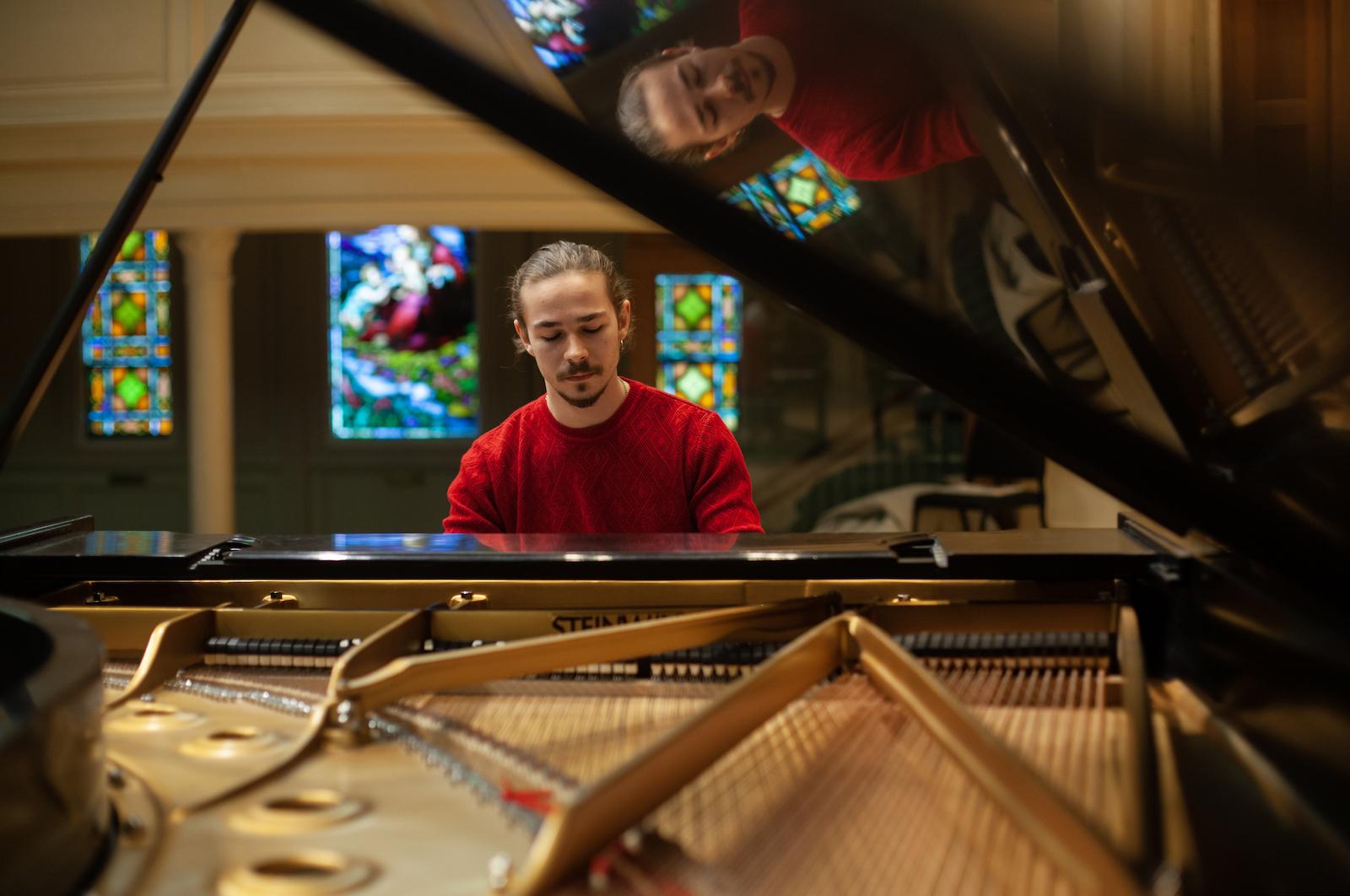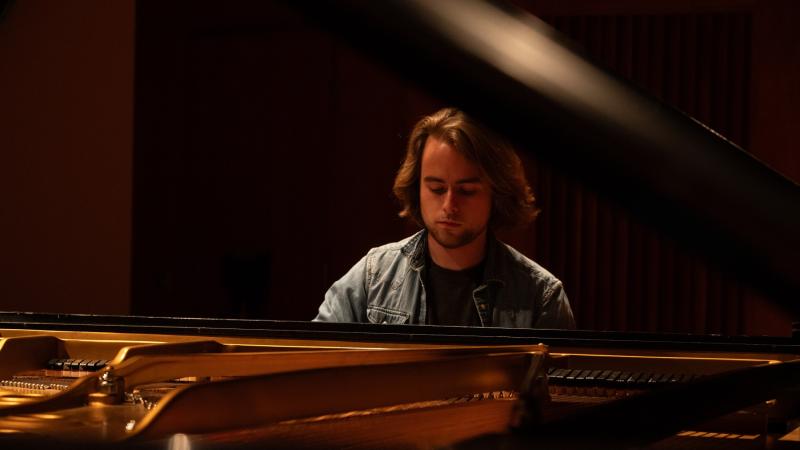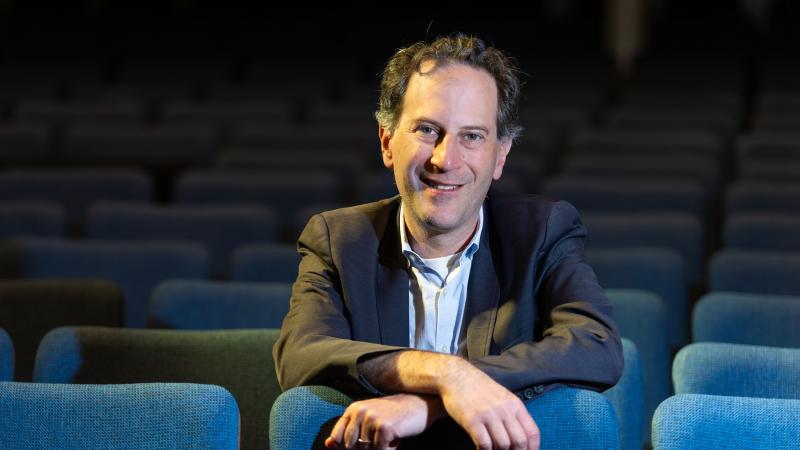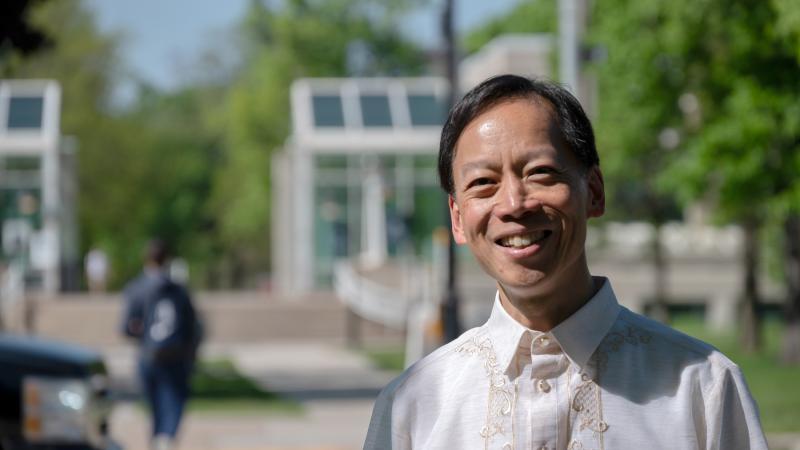Lawrence University faculty and staff, working across multiple departments on a tight timeline, collaborated to enroll a talented piano student from Ukraine after Russia’s attack on his country put his college plans in limbo.
Bohdan Tataryn arrived on campus Sept. 2, just in time for Lawrence to welcome the Class of 2026 and kick off Fall Term. It followed a four-month whirlwind that tested the 18-year-old’s resilience and had Lawrence officials working with urgency to make it happen, including securing an international student visa in Poland just hours before Bohdan’s scheduled flight to the United States.

Bohdan Tataryn (front) joins classmates for a Class of 2026 photo in front of Memorial Chapel during Welcome Week in September.
Marcy O’Malley, Lawrence’s director of international admissions, said she and her Admissions colleagues erupted in cheers when she got the text from Bohdan that his interview with the consul in Poland went off as planned, the visa was secured, and he was on his way.
“Yes, we do this job to keep our colleges vibrant and viable, but every once in a while, we are able to see how a college can pull together and beat all the odds and change a student’s life,” O’Malley said. “It probably shouldn’t have worked, but like so many things that we have learned about the Ukrainians, Bohdan’s family never gave up and Lawrence was able to respond. … It was my favorite day at Lawrence.”
A life disrupted
The story of Bohdan’s journey is one of heartbreak, hope, and perseverance.
Music was ever-present for Bohdan as he grew up in Vynnychky, a small village 13 miles outside Lviv in western Ukraine. His father would sing Ukrainian folk songs; his mother would play the stringed bandura, a Ukrainian folk instrument. Like his three siblings—an older brother, younger sister, and younger brother— Bohdan would study music from his earliest years.
“Music was everywhere and in everything,” Bohdan said. “All the time, I was surrounded by music.”
Until he wasn’t.
International students make up 17% of our student body, and they thrive in our welcoming and supportive community.
It was a year ago Feb. 24 that Russia invaded Ukraine, launching a war that has killed tens of thousands and upended lives across Ukraine and beyond. Bohdan was 18 and midway through his final year at a music preparatory school, with plans to enroll in the fall at Lviv National Music Academy to continue his piano studies.
Russia’s invasion short-circuited those plans, setting off a series of events that would lead to Bohdan landing in Appleton, more than 4,000 miles from home, in time to begin classes in Lawrence’s Conservatory of Music in September.
“Everything changed”
When the war began, Bohdan thought he’d be heading east to join the fight. But he has asthma, making him ineligible to serve in the Army. While he did volunteer work—helping to load supplies on trucks that were heading to the front lines and working with a territory defense group that produced handmade blood-stopping harnesses—his focus would remain on his studies.
“We’re not in the worst part, not part of the front. But alarms were going off. Alarms would go off and you’d have to go to the shelter because you don’t know if there are missiles flying through your area."
Bohdan Tataryn
“Life changed,” Bohdan said. “Everything changed. We’re not in the worst part, not part of the front. But alarms were going off. Alarms would go off and you’d have to go to the shelter because you don’t know if there are missiles flying through your area. Once I looked up and saw a missile flying above my house. It’s a terrible feeling.”
Mary Deckert, meanwhile, was watching news reports out of Ukraine from her home in Richland Center, a city of 5,000 midway between Madison and La Crosse in southwestern Wisconsin. She had hosted Bohdan’s mother, Natalia, as an exchange student 25 years earlier. They stayed in a touch for a while, with Deckert twice visiting in Ukraine, the last time 18 years ago, when Bohdan was 4 months old.
“We had kind of lost track of each other,” said Deckert, now 83. “Eighteen years is a long time.”
News reports of the war were alarming, and Deckert went in search of a phone number so she could check on her old friend. She and Natalia began having frequent conversations, including about the possibility of Bohdan coming to the United States to study music. Natalia sent Deckert four demo videos.
“I’m not a pianist, so I took them to people who are and who teach piano,” Deckert said. “The first guy said, ‘He needs to be in a conservatory; he is very, very good.’ I took them to three other places, and they all said the same thing.”
Lawrence steps up
That led Deckert to Lawrence, where she first connected with Rosie Cannizzo in the Conservatory and then O’Malley in Admissions. It was late spring, well past the usual window for considering international applicants.
While there was a want to help, O’Malley admitted she wasn’t optimistic Bohdan was ready to join a Conservatory of this stature or if there was enough time. And then she watched one of the videos.
“When I saw it, I was blown away,” she said. “I ran—I’m not exaggerating—I ran down the hall and got Mary Kate [Smith, director of Conservatory admissions]. We watched it together. The recording wasn’t great, but it was clear that this was a gifted musician. Mary Kate said, ‘Yes, we’d want him here,’ and she went to work coordinating the Conservatory audition.”
There were still finances to consider, a student visa application, and travel dilemmas.
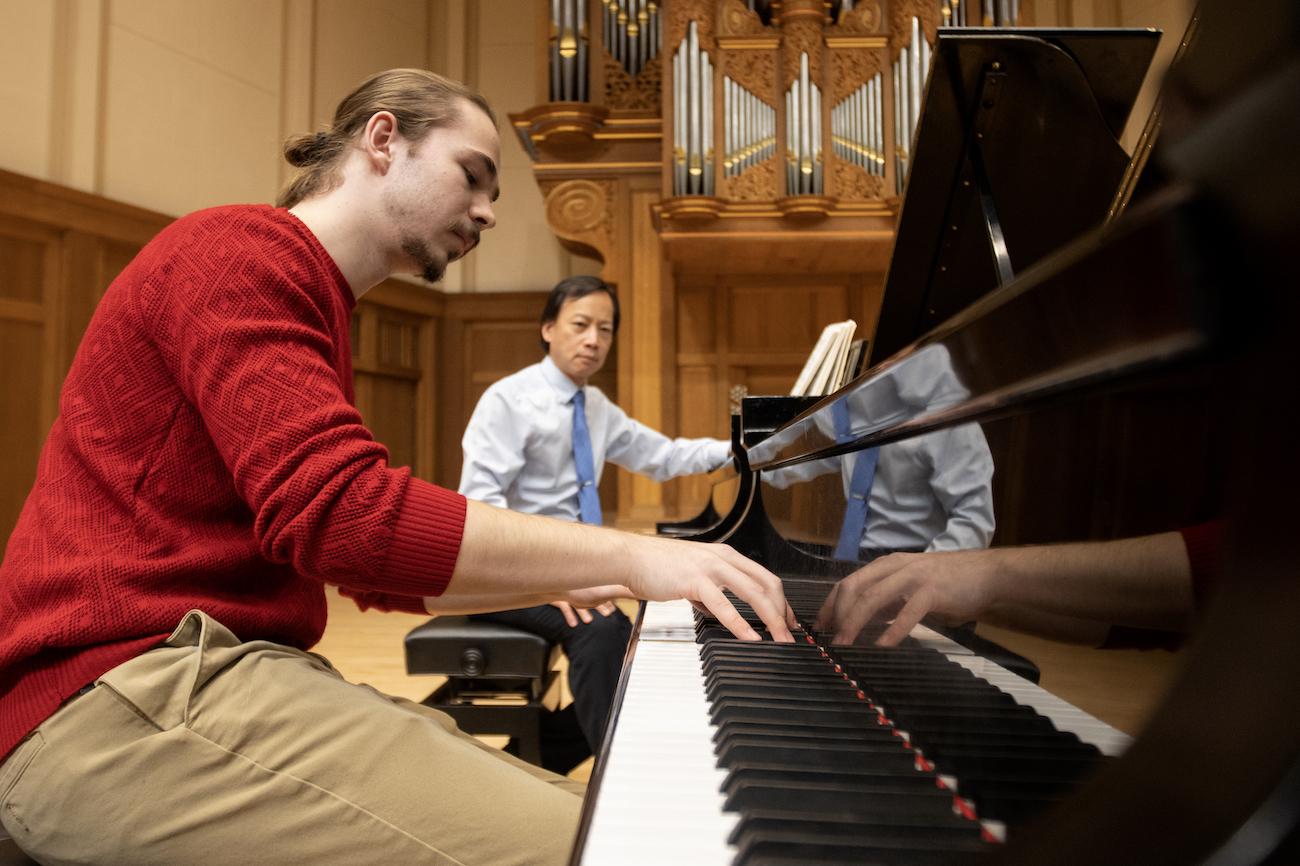
Piano professor Anthony Padilla works with Bohdan Tataryn during a teaching session on the Memorial Chapel stage.
“There were so many obstacles to enrollment, but our thought was we’d keep trying until we ran out of time,” O’Malley said.
A generous scholarship was approved. The Office of Financial Aid fast-tracked an offer.
“In international admissions, we admit the bulk of our students in the winter and early spring,” O’Malley said. “Because the review of foreign credentials and the creation of a visa application is a longer process, it is difficult to process an admit quickly. Additionally, the Conservatory audition process logistically takes time and coordination between the Conservatory Admissions team and the Conservatory faculty, and it was already finished for the year. But we had heard so many stories of the war in Ukraine; everyone I spoke to was feeling the same way—if we have a chance to help a student out of that, then let’s try.”
"Everyone I spoke to was feeling the same way—if we have a chance to help a student out of that, then let’s try.”
Marcy O'Malley, director of international admissions
Anthony Padilla, a piano professor in the Lawrence Conservatory, joined the conversation. The withdrawal of another student from his piano studio had provided an opening.
Bohdan’s audition recordings included a dramatic etude by Ukrainian composer Viktor Kosenko that left Padilla and colleagues impressed.
“None of us in the Piano Department had ever heard it,” Padilla said.
A need to learn English
Bohdan spoke Ukrainian, Polish, and Russian fluently. His English was minimal.
His mother spoke English; she even taught it in Ukraine. She would serve as Bohdan’s tutor for the next four months. Each night after school, she and Bohdan would huddle for English lessons.
“Three hours every night,” Bohdan said. “It was difficult.”
Come early summer, in the middle of those marathon study sessions, he got word from Lawrence that he had been accepted, contingent on the visa process being doable.
“During those months of preparing to come here, I kept saying, ‘What have I done?’” Bohdan said. “At first, I couldn’t even understand, oh my God, I’m going to the U.S. to a university. I thought I was dreaming. It couldn’t be like that. It all happened very quickly.”
On Sept. 2, he would fly from Poland, where he was able to get the visa with just hours to spare. He would make a stop in Norway en route to the U.S., then in Florida and Georgia before landing in Appleton. It was his first time flying alone, first time being away from his family, first time traveling outside of Ukraine.
For nearly 30 hours, Bohdan said, from the time he left Poland until he touched down at Appleton International Airport, he felt like he couldn’t breathe.
“It was a lot of stress,” he said. “Somehow, I handled it.”
Deckert, who signed on as his sponsor, was there to meet him at the airport.
Life at Lawrence
Activities in the Conservatory take up much of his time, Bohdan said. It often feels overwhelming. Homesickness and worry about his family are constant companions. The welcome he’s felt at Lawrence, though, has eased his concerns.
“Everyone was, and still is, very nice to me,” Bohdan said. “I don’t know if it is because of my accent or if people here are just nice. It was not difficult to get used to life here.”

Bohdan Tataryn: "It was not difficult to get used to life here.”
In the Conservatory, Padilla said Bohdan quickly found his groove. He called Bohdan a “wonderful addition to my studio, the Lawrence Piano Department, and the entire Conservatory.”
Padilla has helped Bohdan stay connected to music from home, including the piece from Kosenko that he first shared in his audition video.
“I encouraged Bohdan to continue performing it in my studio classes, in our fall recital, and at the state auditions of the MTNA [Music Teachers National Association] Young Artists Piano Performance Competition in order to introduce unfamiliar Ukrainian music to American audiences,” Padilla said.
Lawrence’s music librarian set out to locate a score for the Kosenko work and found that it is out of print and unavailable at any library in North America. Bohdan then arranged to have the score sent from his instructors in Ukraine for use at the MTNA event. Bohdan would earn an honorable mention award in the competition, held in Rice Lake.
This term, Bohdan is learning a piano work by another Ukrainian composer, Stanislav Lyudkevich. Again, no score was available in North America, so Bohdan began corresponding with the artistic director of a museum in Ukraine about accessing music by Lyudkevich and other Ukrainian composers.
“Bohdan’s piano studio colleagues and I are fascinated by this unfamiliar repertoire and are eager to learn and perform these works as well,” Padilla said
Staying in touch with family
Bohdan said he’s been able to talk or text with his family daily. They feel safe, Bohdan said, but the war hangs over every conversation.
“I read news reports every day,” he said. “In the morning, during lunch, at night.”
Deckert, meanwhile, is in frequent contact with both Bohdan and his family. Bohdan stayed at her Richland Center home during the nearly six-week winter break and may do the same come summer. A newly donated piano in Deckert’s home is available to Bohdan whenever he’s there.
“He’s a wonderful young man,” Deckert said. “What he’s accomplished in the first months at Lawrence is unbelievable—overcoming English, overcoming leaving home for the first time, leaving with his family in such a perilous position. He’s just a well-deserving young man.”
Bohdan said he can’t begin to thank Deckert enough for the investment she’s made in him and his family.
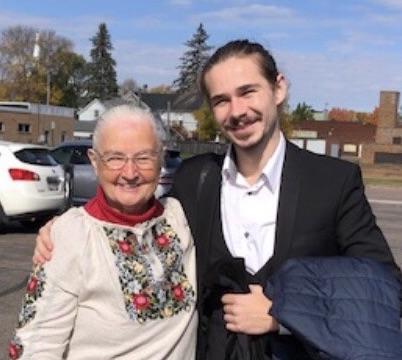
Mary Deckert shares a moment with Bohdan Tataryn while wearing a traditional Ukrainian blouse he brought her.
“At the age of 83, she became the main initiator and a driving force of the whole process of my coming to the USA,” he said. “She is not only an amazingly generous person … but also she is a kind, caring grandma who gives me her constant support and warmth when I am so far away from home.”
Bohdan said he’s equally grateful for the efforts Lawrence made to bring him here, including staff in the Conservatory, Admissions, and Financial Aid offices working above and beyond to make his enrollment possible.
“I thank them very much for awarding me the exceptional scholarship, and I understand that I received it for my high academic achievements as a pianist, but also that it was a great, decisive, unprecedented, and sincere act of support for Ukraine.”
